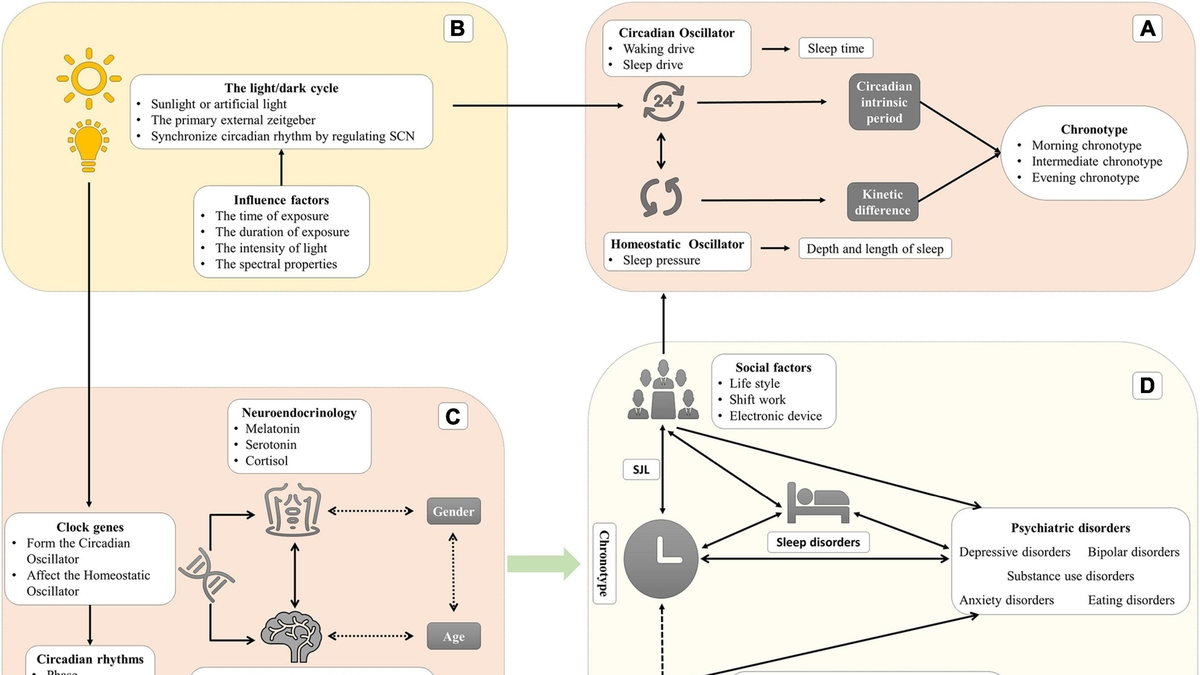
Recent evidence suggests that sleep and internal body clock disturbances can trigger or exacerbate various psychiatric disorders. In a review published in the Proceedings of the National Academy of Sciences, researchers have highlighted the importance of understanding this relationship to develop comprehensive treatments. Insomnia and circadian rhythm sleep-wake disorders (CRSWD) are particularly common in individuals with psychiatric disorders, especially among adolescents and young adults.
The Complex Relationship between Sleep, Circadian Rhythms, and Mental Health
The body’s internal clock, or circadian rhythm, is responsible for regulating numerous biological processes, including sleep. According to the review, disturbances in this internal rhythm, often manifested as insomnia or other sleep disorders, are prevalent in people with mental health disorders. For instance, endogenous cortisol rhythms, a key process in the body clock, have been found to be disrupted in patients with bipolar disorder.
The mechanisms behind these sleep-circadian disturbances are complex and multifaceted. They include genetic predisposition, exposure to light, neuroplasticity, and physiological and behavioral changes that occur during adolescence. These factors can interact in various ways, leading to a range of sleep and circadian disturbances that can impact psychiatric health.
Differences in Sleep Patterns among Psychiatric Patients
Studies have found significant differences in sleep patterns and rhythms among patients presenting unipolar or bipolar major depressive episodes. Those with bipolar major depressive episodes often exhibit symptoms of hypersomnia and motor retardation, while those with unipolar major depressive episodes typically experience poorer sleep quality, including insomnia and low sleep efficiency.
Interventions and Therapies: A Holistic Approach
The understanding of the relationship between sleep, circadian rhythms, and mental disorders has paved the way for innovative interventions and therapies. These include Cognitive Behavioral Therapy for Insomnia (CBT-I), light therapy, and personalized interventions that address different aspects of sleep and circadian rhythms. Timing of medication, meals, and exercise can also impact circadian phases and could be factored into treatment plans.
For example, CBT-I has been shown to reduce anxiety and depressive symptoms. Light therapy has also been found effective in treating depression. Moreover, multicomponent interventions, which address different aspects of sleep and circadian rhythms, are emerging as promising strategies to improve mental health outcomes.
Advances in Sleep and Circadian Science: A Gateway to Improved Mental Health Treatment
The review suggests that advancements in sleep and circadian science could unlock improved understanding and treatment of psychiatric disorders. Research into mental health is leveraging these advances to develop new preventative measures and therapies. Oxidative stress and redox dysregulation, for instance, are now recognized as significant factors in the pathophysiology of disorders like bipolar disorder and schizophrenia. Novel therapeutic approaches, such as the ketogenic diet, are also being explored for their potential benefits.
In conclusion, the complex interplay between sleep, circadian rhythms, and psychiatric disorders calls for a holistic approach to mental health treatment. By integrating advances in sleep and circadian science into mental health care, we can hope to offer more effective solutions for those struggling with psychiatric disorders.
